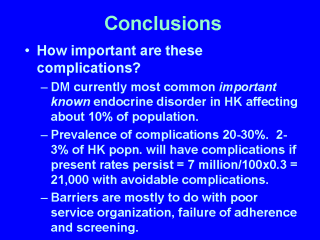 |
So, why is the
rate of complications in DM lower in HK in the PRC? Mainly because, though short of being
ideal, service in HK are much better than in the PRC. These aspects include better
screening and attention to the need for lifestyle change in HK on the patient has been
referred to Specialist Clinics. In PRC, there is probably almost no screening for DM or
for its complications except in the (far fewer) specialist clinics. There is probably
little patient education or realization among patients of the meaning of having DM, its
consequences or the need to make changes. Community educational levels are an important
factor to consider. HK has a higher educational level overall. Also, people in HK have
more options open to them for lifestyle change than their counterparts in PRC. To
summarize, probably the most important reasons for the relatively high rate of
complications from DM is poor detection, screening and follow-up. With change of policy,
management of DM could improve coverage of complication-screening. Specialist centres are
more likely to screen for complications than GPs, however, specialist units are no
guarantee of continuity of care, good case notes or patient education. They are also very
expensive. Improving shared-care (between patient-GP and endocrinologist) provides the
best option for reducing complications from DM.
However, by far the most important issue, and the one carrying the greatest population
attributable risk, is the failure to tackle the inactivity and over-eating that is
widespread in our culture. |
